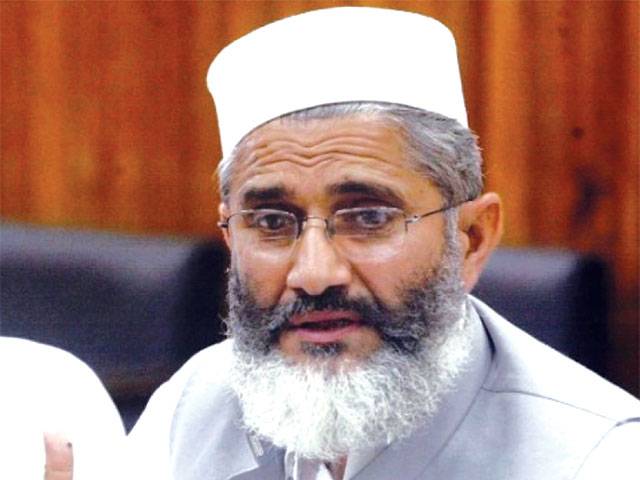LAHORE - Although a coalition partner with the Pakistan Tehreek-e-Insaf in the KP, the Jamaat-i-Islami doesn’t support Imran Khan’s claim that 2015 is going to be year of general elections.
JI chief Sirajul Haq said in an interview to The Nation at his Mansoora office on Tuesday that his party wants the federal and the provincial governments to complete their constitutional term so that the day of next elections becomes a “day of judgment” for all those in power at present.
“Perhaps Imran Khan called 2015 the year of elections because the local government polls are due to be held during the next few months”, a soft-spoken JI chief said, clearly trying to suppress his smile on the PTI chairman’s repeated assertions.
Asked why the Jamaat-i-Islami has failed to emerge as a formidable political force despite several decades of its presence in the field, Sirajul Haq said the JI is an ideological party and its performance should not be judged on the basis of the number of seats it gets in elections. The fundamental job before the Jamaat is to reform people’s beliefs and bring them closer to their Creator. “We have launched a number of public welfare projects; we run a number of educational institutions; participation in electoral process is only a part of our agenda”.
As for the Jamaat’s poor performance in elections, Sirajul Haq said nobody should forget that politics has been monopolised by the capitalists and feudal who regard elections as a business. Since the Jamaat doesn’t give tickets to people with ill-gotten money, its candidates lose elections.
“We have succeeded on the ideological front. Our performance should not be measured on the touchstone of assembly seats”.
He regretted that the people of Pakistan don’t cast votes on merit. They, in fact, use their votes keeping in mind their “economic compulsions”.
The Jamaat chief, 52, said he would try to bring the oppressed classes out against the “bourgeois” who are always very sensitive to their own rights but oblivious of what they are supposed to do for the masses. The purpose of the struggle, he said, would be to force the rulers to improve the system of education, health and justice. “We will be reaching out to the masses”, he said.
“The position of other religio-political parties is no different. They have also failed to gain public support over the past decades. In your opinion what is the future of religious parties in the presence of ‘rightist forces’ like the PML-N and the PTI, who are an attractive destination for the younger generation? What will the religio-political parties have to do to be able to stay as a relevant force?” he was asked.
Sirajul Haq, who took as the Jamaat chief in April last year, said he was “not” in favour of compartmentalising political parties into religious or secular groupings. The constitution of Pakistan is Islamic and any party adhering to this document cannot be called secular.
Parties, he said, should be categorised as ‘right or wrong’, not right or left. “Our fight is against the supporters of the status quo”.
In response to a question, the Jamaat chief said his was the only national party having support from Karachi to Chitral. Other parties calling themselves religious, he said, were sectarian in nature. He advised such entities to get united on the basis of some common ground.
About MQM chief Altaf Hussain’s call for the province’s status to Karachi, Sirajul Haq said this was just a reaction to the operation going on in Karachi and the arrest of elements like Saulat Mirza, Faisal Mota and Ajmal Pahari. The raid on Nine Zero and the recovery of the Nato weapons from there could also be a factor behind this demand, he said.
But, he warned, the country would be heading for very dangerous consequences in case any new province was carved out on linguistic, ethic or sectarian basis.
In his opinion a new province could be set up on administrative grounds, but in the prevailing situation this chapter should be kept closed as such a consideration could create problems in Seraiki areas, Hazara and Pushtoon belt of Balochistan. No step should be taken without a national consensus, he said.
Responding to a question, the Jamaat leader said terrorism had been ‘imported’ and was not a local phenomenon. In his opinion, the wrong policies of Gen Musharraf were responsible for terrorist activities in the country.
He rejected the suggestion that Gen Zia’s Afghan policy had promoted terrorism in Pakistan. It was a great achievement of Gen Zia that he had contained the Soviet Union to Afghanistan. His strategy had the backing of the entire world, he recalled.
Sirajul Haq believed that the incumbent government was capable of uprooting terrorism. “This business would soon be over”, he said. He, however, did not elaborate.
Friday, April 19, 2024
Unlike Imran, Jamaat wants elections held on time
| Siraj wants JI performance judged on ideological ground, not election seats

12:00 PM | April 19, 2024
Minister reviews naan, roti prices
April 19, 2024
ETPB land worth Rs 40b retrieved so far
April 19, 2024
Lahore revamping plan to complete by June 30
April 19, 2024
CCPO reviews security for by-elections, NZ cricket matches
April 19, 2024
A Tense Neighbourhood
April 19, 2024
Dubai Underwater
April 19, 2024
X Debate Continues
April 19, 2024
Hepatitis Challenge
April 18, 2024
IMF Predictions
April 18, 2024
Kite tragedy
April 19, 2024
Discipline dilemma
April 19, 2024
Urgent plea
April 19, 2024
Justice denied
April 18, 2024
AI dilemmas unveiled
April 18, 2024
ePaper - Nawaiwaqt
Advertisement
Nawaiwaqt Group | Copyright © 2024





